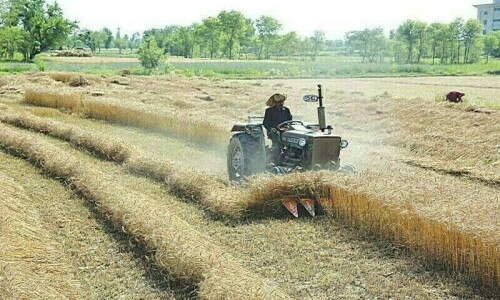Water talks failed to produce agreement in Pakistan’s water dispute with India: WB
WASHINGTON: The World Bank on Wednesday announced that two days of talks with a Pakistani delegation did not lead to an agreement on the way forward in Pakistan’s water dispute with India.
A four-member Pakistani delegation arrived in Washington on Sunday, a day after Indian Prime Minister Narendra Modi inaugurated a controversial dam in India-held Kashmir, for talks with senior World Bank officials. Pakistan fears the dam will reduce its share in the waters of the Indus and its tributaries and will also damage the ecosystem of the Neelum and Jhelum rivers.
The World Bank said that senior bank officials met the Pakistani team, at their request, on May 21-22 and discussed issues regarding the Indus Waters Treaty and opportunities within the treaty to seek an amicable solution to the India-Pakistan water dispute.
The Pakistani agenda for the talks included four key points: the height of the dam built on the Kishanganga River, its capacity to hold water, Pakistan’s demand for setting up a court of arbitration to settle the dispute and India’s counter-demand for an international expert, instead of the court.
In a statement issued after the talks on Wednesday evening, the bank said the Pakistani delegation also shared with it their concerns about the recent inauguration of the Kishanganga hydroelectric plant.
“Several procedural options for resolving the disagreement over the interpretation of the Treaty’s provisions were discussed,” the World Bank said.
“While an agreement on the way forward was not reached at the conclusion of the meetings, the World Bank will continue to work with both countries to resolve the issues in an amicable manner and in line with the treaty provisions.”
As in a previous statement, the bank insisted that the Indus Waters Treaty was a profoundly important international agreement that provides an essential cooperative framework for India and Pakistan to “address current and future challenges of effective water management to meet human needs and achieve development goals”.
The World Bank said that the treaty only gives it a “limited and procedural” role in resolving India-Pakistan water disputes, although the bank supervised the negotiations for the treaty and is recognised as an arbitrator by both countries.
In particular, the role in relation to ‘differences’ and ‘disputes’ was “limited to the designation of people to fulfil certain roles when requested by either or both parties,” the bank said.
The World Bank assured India and Pakistan that it “remains committed to act in good faith and with complete impartiality and transparency in fulfilling its responsibilities under the Treaty, while continuing to assist the countries”.
The Indus system of rivers comprises three western rivers — the Indus, Jhelum and Chenab — and three eastern rivers — the Sutlej, Beas and Ravi. The controversial Kishanganga dam is built on Neelum, which is a tributary of the Jhelum River.
The 1960 Indus Waters Treaty gives Pakistan exclusive use of the western rivers, the Jhelum, Chenab and Indus, while the eastern rivers — Ravi, Beas and Sutlej — go to India.
Although the World Bank issued a comprehensive statement on the two-day talks, the Pakistani team, which was led by Attorney General Ashtar Awsaf Ali, has remained silent.
It’s not clear if the delegation will also meet US officials and seek their help in seeking a peaceful end to its water disputes with India. In the past, Pakistan maintained a close liaison with the United States over such issues and Washington did play an effective role in easing tensions between South Asia’s two nuclear neighbours.
Published in Dawn, May 24th, 2018













































